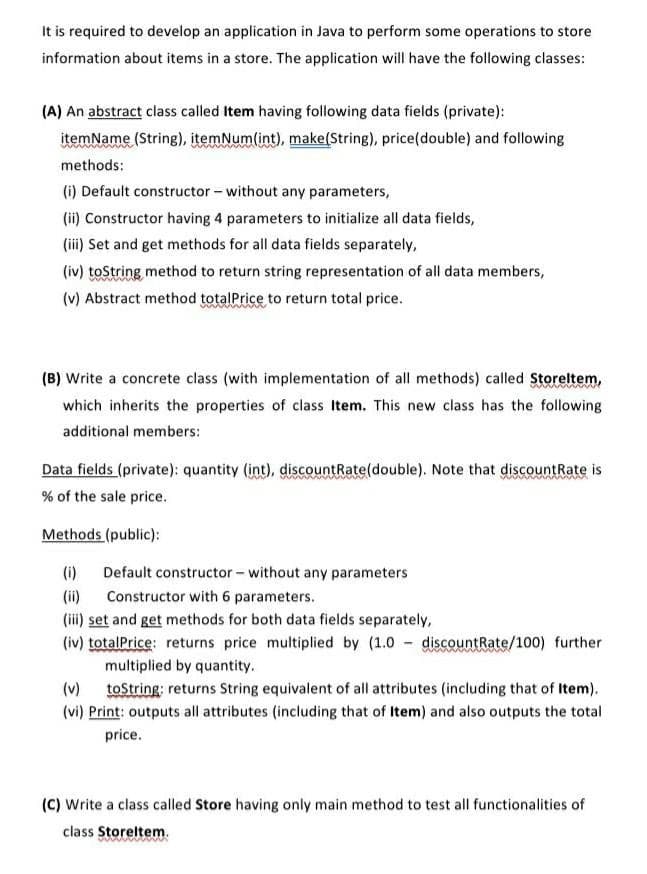It is required to develop an application in Java to perform some operations to store information about items in a store. The application will have the following classes: (A) An abstract class called Item having following data fields (private): itemName (String), itemNum(int), make(String), price(double) and following methods: (i) Default constructor - without any parameters, (ii) Constructor having 4 parameters to initialize all data fields, (iii) Set and get methods for all data fields separately, (iv) toString method to return string representation of all data members, (v) Abstract method totalPrice to return total price. (B) Write a concrete class (with implementation of all methods) called Storeltem, which inherits the properties of class Item. This new class has the following additional members: Data fields (private): quantity (int), discountRate(double). Note that discountRate is % of the sale price. Methods (public): (i) Default constructor - without any parameters Constructor with 6 parameters. (iii) set and get methods for both data fields separately, (iv) totalPrice: returns price multiplied by (1.0 discountRate/100) further multiplied by quantity. (v) toString: returns String equivalent of all attributes (including that of Item). (vi) Print: outputs all attributes (including that of Item) and also outputs the total price. (C) Write a class called Store having only main method to test all functionalities of class Storeltem.
It is required to develop an application in Java to perform some operations to store information about items in a store. The application will have the following classes: (A) An abstract class called Item having following data fields (private): itemName (String), itemNum(int), make(String), price(double) and following methods: (i) Default constructor - without any parameters, (ii) Constructor having 4 parameters to initialize all data fields, (iii) Set and get methods for all data fields separately, (iv) toString method to return string representation of all data members, (v) Abstract method totalPrice to return total price. (B) Write a concrete class (with implementation of all methods) called Storeltem, which inherits the properties of class Item. This new class has the following additional members: Data fields (private): quantity (int), discountRate(double). Note that discountRate is % of the sale price. Methods (public): (i) Default constructor - without any parameters Constructor with 6 parameters. (iii) set and get methods for both data fields separately, (iv) totalPrice: returns price multiplied by (1.0 discountRate/100) further multiplied by quantity. (v) toString: returns String equivalent of all attributes (including that of Item). (vi) Print: outputs all attributes (including that of Item) and also outputs the total price. (C) Write a class called Store having only main method to test all functionalities of class Storeltem.
Computer Networking: A Top-Down Approach (7th Edition)
7th Edition
ISBN:9780133594140
Author:James Kurose, Keith Ross
Publisher:James Kurose, Keith Ross
Chapter1: Computer Networks And The Internet
Section: Chapter Questions
Problem R1RQ: What is the difference between a host and an end system? List several different types of end...
Related questions
Question

Transcribed Image Text:It is required to develop an application in Java to perform some operations to store
information about items in a store. The application will have the following classes:
(A) An abstract class called Item having following data fields (private):
itemName (String), itemNum (int), make(String), price(double) and following
methods:
(i) Default constructor - without any parameters,
(ii) Constructor having 4 parameters to initialize all data fields,
(iii) Set and get methods for all data fields separately,
(iv) toString method to return string representation of all data members,
(v) Abstract method totalPrice to return total price.
(B) Write a concrete class (with implementation of all methods) called Storeltem,
which inherits the properties of class Item. This new class has the following
additional members:
Data fields (private): quantity (int), discountRate(double). Note that discountRate is
% of the sale price.
Methods (public):
(i) Default constructor - without any parameters
Constructor with 6 parameters.
(iii) set and get methods for both data fields separately,
(iv) totalPrice: returns price multiplied by (1.0 discountRate/100) further
multiplied by quantity.
(v) toString: returns String equivalent of all attributes (including that of Item).
(vi) Print: outputs all attributes (including that of Item) and also outputs the total
price.
(C) Write a class called Store having only main method to test all functionalities of
class Storeltem.
Expert Solution
This question has been solved!
Explore an expertly crafted, step-by-step solution for a thorough understanding of key concepts.
Step by step
Solved in 2 steps with 1 images

Recommended textbooks for you

Computer Networking: A Top-Down Approach (7th Edi…
Computer Engineering
ISBN:
9780133594140
Author:
James Kurose, Keith Ross
Publisher:
PEARSON

Computer Organization and Design MIPS Edition, Fi…
Computer Engineering
ISBN:
9780124077263
Author:
David A. Patterson, John L. Hennessy
Publisher:
Elsevier Science

Network+ Guide to Networks (MindTap Course List)
Computer Engineering
ISBN:
9781337569330
Author:
Jill West, Tamara Dean, Jean Andrews
Publisher:
Cengage Learning

Computer Networking: A Top-Down Approach (7th Edi…
Computer Engineering
ISBN:
9780133594140
Author:
James Kurose, Keith Ross
Publisher:
PEARSON

Computer Organization and Design MIPS Edition, Fi…
Computer Engineering
ISBN:
9780124077263
Author:
David A. Patterson, John L. Hennessy
Publisher:
Elsevier Science

Network+ Guide to Networks (MindTap Course List)
Computer Engineering
ISBN:
9781337569330
Author:
Jill West, Tamara Dean, Jean Andrews
Publisher:
Cengage Learning

Concepts of Database Management
Computer Engineering
ISBN:
9781337093422
Author:
Joy L. Starks, Philip J. Pratt, Mary Z. Last
Publisher:
Cengage Learning

Prelude to Programming
Computer Engineering
ISBN:
9780133750423
Author:
VENIT, Stewart
Publisher:
Pearson Education

Sc Business Data Communications and Networking, T…
Computer Engineering
ISBN:
9781119368830
Author:
FITZGERALD
Publisher:
WILEY